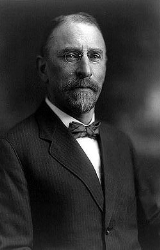
Henry Morgenthau, Sr.
Henry Morgenthau was a U.S. diplomat and businessman, most famous as the American ambassador to the Ottoman Empire during the First World War.
I was sent to Athens
- Soon after Athens had reached the height of its glory under Pericles in the Fifth Century, B. C., and had started on its decline, the rise of Macedon under Philip carried Greek influence into new regions. The glory of Athens had been based upon sea power, but the conquests of Macedon were the work of land armies— Philip invented the invincible phalanx. Upon Philip's death his son, Alexander the Great, set forth to conquer the whole of the then known world, and as that world in his day lay to the east, his marches were in that direction. In a few years he had overrun the fertile plains and opulent cities of Asia Minor, Syria, Mesopotamia, and Persia, and had carried his conquests to the gates of Delhi. In all the cities in the intervening countries he left large garrisons of Greek soldiers. In many of these countries he founded flourishing new cities. In every place his soldiers were followed by large colonies of Greek civilians. The result was that the whole of western Asia, and of what we call the Near East, including Asia Minor Egypt, Palestine, Syria, Babylonia, Mesopotamia, Persia, and northwestern India, was saturated with the Greek influence and with Greek colonies.
- The imagination of these conquered peoples was dazzled by the introduction of Greek art, literature, philosophy, and public works. Though the successors of Alexander were unable to maintain the political control of the lands he conquered, and though successive waves of Roman, Arabian, and Tartar conquests swept over these lands in succeeding centuries, none of the later conquerors has been able wholly to eradicate the influence of Greek culture, nor to exterminate that element of population which was of Greek blood.
- ….The Greek War of Independence, which came to a successful conclusion in 1832, affected less than one half of the Greeks in the Turkish Empire. It did not bring freedom to the Greeks of Macedonia and Thrace, of Crete and the Aegean Islands, nor to the more than two million Greeks in Asia Minor and Constantinople.
- When the Turks and the Bulgarians left, Macedonia remained a purely Greek region.
